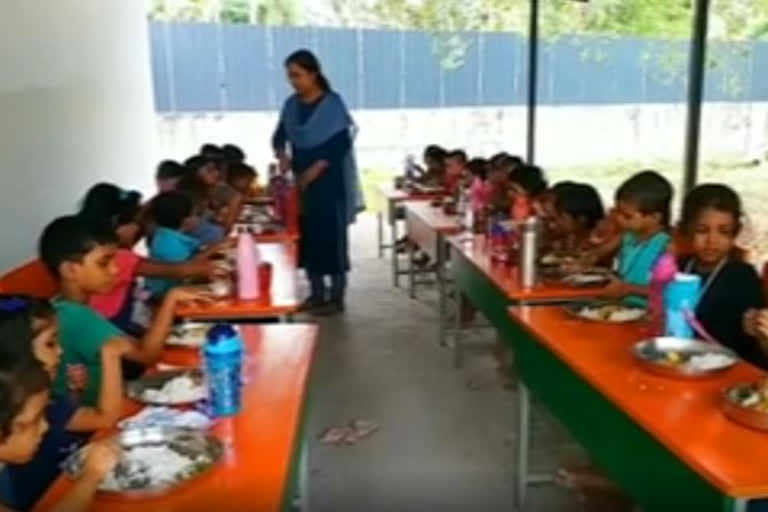Kozhikode: Kerala has been a front runner in providing quality public education to its children in the country. When the public education system underwent a revolutionary change, both in infrastructure and quality of the curriculum, more and more children were leaving private schools to join government schools in Kerala.
Along with education, the Mid Day Meal Scheme in government schools in Kerala is now rated as the top in the country. From its initial aim of attracting children from poor families to schools and retaining them in education, the Mid Day Meal Scheme has gone several steps ahead in Kerala. It now aims to provide a nutritional, balanced meal to the children up to Class VIII with the motto 'healthy mind in a healthy body. The menu that is being served in nearly 13,000 government schools, covering more than 26 lakh students, arguably, could be the best in the country. A broadly designed weekly menu is being prepared at the state level, with freedom for individual schools and PTA to add items or changes, without compromising on the designed nutritional value.
As per the broadly designed menu, children will be served rice plus green gram, sambar, and a coconut dish on Monday. On Tuesday, rice plus mixed vegetable sabji (Avial), soup, and pickles. On Wednesday, rice, vegetable curry, green gram or red gram stir fry, and a coconut dish. On Thursday, rice, green gram dal curry, and vegetable dish. On Friday, rice, Bengal gram, or green gram plus sambar. In addition to this, eggs and 'Nendran' banana are provided once a week and milk twice a week. Many schools are also including fish and meat at least once a week on the menu. The nutritional team has also designed a chart that ensures leafy vegetables, colored vegetables (red, yellow, and orange), pulses, white or tan vegetables, and green vegetables in the menu.
"The noon meal auditing is being done very strictly. Even if small malpractice comes to the notice, the headmaster will be suspended immediately. So every headmaster is taking care of all aspects of this scheme very vigilantly," says Santhosh T, Headmaster of Nadakkavu Government Girls High School.
Also read: Fund crunch: Free food kits distribution to be prioritized in Kerala
There is a Mid Day Meal Committee that is constituted at each school. The president of the Parent Teachers Association (PTA) is the chairman of the committee and the headmaster of the school is the member secretary. The committee also has members of PTA, parents of SC/ST children, parents of minority communities, teachers, and the ward member from the local self-government as its members. The committee is convened once every month to decide on the menu for the next month. The happiness of getting hygienic, healthy, and tasty food from the school is also evident on the faces of the children. "Here food is all good. I love it and I eat properly. It's neat, healthy, and hygienic," the children are unanimous in their opinion about the noon meal served in schools.
When the noon meal scheme started in Kerala in 1984, much ahead of the introduction of the plan by the Central Government, it was the millet uppuma that was served to the children. When the program was launched only 222 LP schools in the coastal belt were covered. In 1985, the scheme was extended to all LP schools in the state, and in the academic year of 1987-88, the scheme was made available to all students up to Class VII. The scheme was finally extended to all students of Class VIII in the year 2007-08. When the Central government introduced this scheme as a centrally sponsored one in 1995, the Government of Kerala decided to continue its existing scheme. The Mid Day Meal Scheme now covers all students up to Class VIII studying in government schools, aided schools, special schools, and schools run by local bodies. Kerala government is spending more than Rs 600 crore per annum for the scheme.
In addition to what government spends on food for the children, the active participation of parents and philanthropists makes this a unique programme in Kerala. Vegetables grown in kitchen gardens and special items sponsored by the public are also served along with the pre-planned menu. Many parents are now coming forward to celebrate their children's birthdays with a difference. Instead of the usual practice of sending sweets to the classmates to celebrate birthdays, now materials are provided to the school kitchen for making special dishes for children.



